Calendar
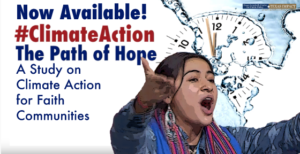
You are invited to join an online discussion series built around 15-minute videos featuring interviews with US faith leaders, representatives of climate-impacted communities from the global South, and presentations by UN officials and other experts. The videos walk viewers through four key climate policy issues that intersect with universal faith concerns for vulnerable and marginalized people. The series focuses on how climate change is impacting the core ministries of faith communities around the world, how those impacts will increase in the future, and why these impacts create an imperative for people of faith to advocate for strong US climate action.  A discussion guide is included that asks participants to think deeply about how their own local faith community’s direct service programs intersect with climate impacts, and how knowledge and experiences gained through these programs might help to inform climate policy. The study’s Action Center provides practical, step-by-step instructions for advocacy activities, as well as recommended policy asks for local, state, and national leaders.  Join us! Please register on www.eventbrite.com at https://www.eventbrite.com/e/the-path-of-hope-a-study-on-climate-action-for-faith-communities-tickets-273103288287. Contact Lisa Brenskelle at gcs.lrc@gmail.com for more information.
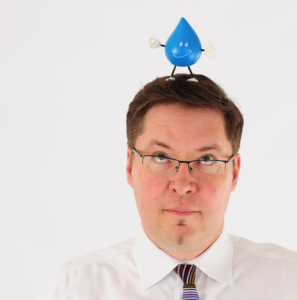
Groundwater is, as famously quoted by the Texas Supreme Court in 1904, “secret, occult, and concealed.†Sometimes referred to as “hidden water,†it is out of sight and, therefore, unfortunately, out of mind. However, groundwater comprises 98.7 percent of all the fresh, unfrozen water on Earth. About 40 percent of all surface-water flows in the United States are sourced from innumerable seeps and springs that discharge groundwater into streams and rivers. Groundwater supports 26 percent of the human use of water with 70 percent of it watering crops. As drier areas become drier and droughts increase everywhere, groundwater is expected to make up the difference. Unfortunately, much of the groundwater used across the planet is produced unsustainably. This unsustainable use affects flows to springs, streams, rivers, wetlands, and estuaries that support ecologies as well as human needs. In some cases, such as in the Houston area, groundwater production has caused the land to sink, increasing flooding. In this presentation, Professor Mace will present what he has learned about groundwater sustainability through a report he published late last year title “Five Gallons in a Ten-Gallon Hat: Groundwater Sustainability in Texas†and in a forthcoming book titled “Groundwater Sustainability: Its Birth, Development, and Application.†Listeners will have a better understanding of what groundwater sustainability is, how Texas and the greater Houston area is doing with sustainable groundwater management, and what people can do to achieve groundwater sustainability. Time for interactive discussion with the speaker will be provided. Please register for this talk on www.eventbrite.com at https://www.eventbrite.com/e/how-long-will-our-aquifers-last-tickets-314757356727. Contact Lisa Brenskelle at gcs.lrc@gmail.com with any questions.
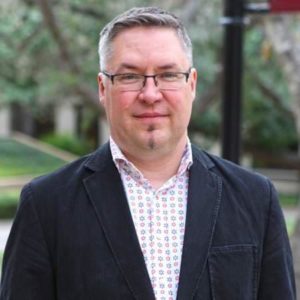
Join Professor Robert Mace of Texas State University for a discussion on freshwater scarcity. Growing populations, the ever-present threat of drought, aquifer over-pumping, reservoir sedimentation, and climate change are creating a perfect storm to challenge the resiliency of our water supplies. Since water is needed for human health, agriculture, industry, energy, recreation, and the environment and it takes decades to develop new water supplies, it’s critical for societies to carefully plan for today’s and tomorrow’s water. We all play a role here, whether through giving decisionmakers courage to plan for the future, supporting the development of new water supplies, and using water as efficiently as possible in our daily lives. Time for interactive discussion will be provided after his talk. Register for this talk on www.eventbrite.com. All registrants will receive a recording of the talk afterward. Contact Lisa Brenskelle at gcs.lrc@gmail.com for more information.
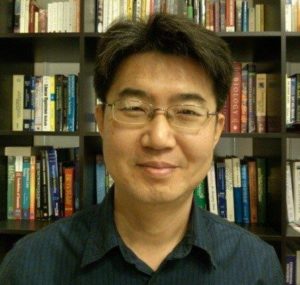
Join Professor Hyun-Min Hwang of Texas Southern University as he examines the issue of plastic pollution.   Plastic is a polymeric material, not biodegradable, and may last hundreds of years in the environment. Substantial fractions of plastic waste are disposed of improperly, and are found everywhere, even in the middle of the ocean and deep-sea floor.  Small plastics, known as microplastics, accumulate inside of animal bodies and pass through food chains. Some plastics contain harmful chemicals added intentionally during manufacturing processes. These chemicals leached from plastics can cause toxic impacts on humans and wildlife. Plastic production is fast-increasing, so the amount of plastic waste in the environment will also continuously increase unless we change the way we live with plastics. There are easy-to-follow practices we can apply to everyday life to help protect, preserve, and sustain natural resources. The future is up to us. Join Professor Hwang to consider how we can make the earth a better place to live for ourselves, future generations, and wildlife as well. Time for interactive discussion will be provided after his talk. Register for this talk on www.eventbrite.com. All registrants will receive a recording of the talk afterward. Contact Lisa Brenskelle at gcs.lrc@gmail.com for more information.
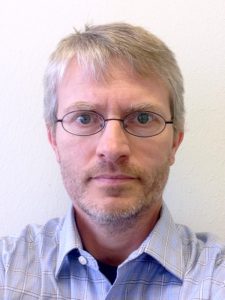
Join Professor Gunnar Schade of Texas A&M University to learn about the issue of air pollution. Air pollution is a major factor for public health throughout the world. An increasing human population, increasingly clustered in urban areas, is exposed to a variety of air pollutants. Among the common pollutants, fine particulate matter and ozone exposure dominate health effects, which have become much better understood in the last two decades. While air quality has improved in much of the western world, population growth and the continued usage of fossil fuels to power economic growth has worsened air quality almost everywhere else. As the overwhelming amount of air pollution is caused by fossil fuels, namely their mining, combustion and widespread consumer use, a rapid transition to renewable energy use alongside the “electrification of everything” is expected to near eliminate air pollution as an environmental problem in the 21st century. Whether this can be achieved is therefore closely linked to climate change mitigation via phasing out fossil fuel use in energy production and agriculture. Time for interactive discussion will be provided after his talk. Register for this talk on www.eventbrite.com at: https://www.eventbrite.com/e/the-big-four-major-global-environmental-issues-their-causes-effects-s-tickets-378315811777. All registrants will receive a recording of the talk afterward. Contact Lisa Brenskelle at gcs.lrc@gmail.com for more information.

Join Professor Sylvia Dee of Rice University to consider climate change, its causes, impacts, and solutions. There is now a long-established global scientific consensus that climate change will damage human and natural systems at high expense. Climate change-induced disruptions to human-environment interactions occur via impacts such as sea level rise, storm surge, tropical cyclones, and degradation of ecosystems and resources. Earth is already responding more quickly than predicted to rapidly shifting, pervasive radiative forcing. Our species’ future will depend on our ability to adapt to and mitigate this response. Houston provides a geopolitically relevant model city for the impacts of climate change in low-lying coastal zones in the subtropics, where, globally, the highest development rates are occurring. The increasing frequency of flooding due to tropical storms and extreme rainfall have already cost hundreds of billions of dollars, and pose an existential threat to the nation’s energy security. Houston is ground zero for the study of the impacts of climate change on coastal cities and energy infrastructure. In cities housing critical hubs for the petrochemical industry, the economic effects of climate change will resonate widely. In this talk, Dr. Dee will summarize the science of climate change and the social challenges that accompany it, as well as the urgent need for solutions that can be adopted now to mitigate the social and economic consequences of environmental degradation. Time for interactive discussion will be provided after her talk. Register for this talk on www.eventbrite.com at: https://www.eventbrite.com/e/the-big-four-major-global-environmental-issues-their-causes-effects-s-tickets-378315811777. All registrants will receive a recording of the talk afterward. Contact Lisa Brenskelle at gcs.lrc@gmail.com for more information.

Gardening and growing fruit, vegetables, and herbs organically is easy when recreating systems of nature to incorporate plants for wildlife and for people. Gardening in the gulf coast climate allows us to grow year around. Carol Burton, Director of Garden Education at Urban Harvest will explore the seasons from Summer gardening strategies to Fall transitions for a bumper cool season crop and the top five fruit trees to get started. Time for interactive discussion with the speaker will be provided. Please register for this talk on www.eventbrite.com. Contact Lisa Brenskelle at gcs.lrc@gmail.com with any questions.
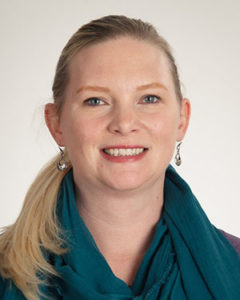
Join Professor Kerri Crawford of the University of Houston for a talk on the issue of biodiversity loss. Our planet is home to millions of species that rely on each other and provide important ecosystem services. Humans, too, rely on nature — but we take a disproportionate amount of the resources and modify the environment in ways that negatively affect other species. Our effects on the environment are directly causing what many have termed “the 6th mass extinction.” In this presentation, Dr. Crawford will provide information on what biodiversity is, how quickly we are losing biodiversity, why biodiversity is important for us, and what is being done to protect biodiversity.  Time for interactive discussion will be provided after her talk. Register for this talk on www.eventbrite.com. All registrants will receive a recording of the talk afterward. Contact Lisa Brenskelle at gcs.lrc@gmail.com for more information.
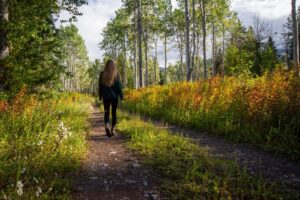
Experience forest bathing, led by a certified guide, followed by practice of the Christian spiritual discipline of the Earth Examen. Forest bathing, a practice that originated in Japan, involves taking in, in all of one’s senses, the forest atmosphere. Not simply a walk in the woods, it is the conscious and contemplative practice of being immersed in the sights, sounds and smells of the forest. Forest bathing has been shown to reduce stress, improve mood and focus, enhance creativity, and lead to an increased sense of calm and altruistic behavior, in addition to other benefits such as boosting the immune system and lowering blood pressure. As Christians, we understand that God is present in God’s creation, and after our guided forest bath, we’ll spend some time considering the Earth Examen as we reflect both on our time spent forest bathing and on our relationship with all creation. This activity is for a small group and space is limited. Please register at www.eventbrite.com. Contact Lisa Brenskelle at gcs.lrc@gmail.com with any questions.

It is well known that global warming and associated climate changes are linked to the increase of greenhouse gases such as carbon dioxide and methane in the atmosphere. Humans generate anthropogenic carbon dioxide and methane in many different ways. A carbon footprint is the total amount of carbon dioxide and methane that are generated as a result of an individual’s actions per year. The average carbon footprint of the U.S. is 16 tons, which is much higher than global average (about 4 tons). To avoid catastrophic climate change, nations across the globe agreed to reduce the global average carbon footprint to 2 tons by 2050. The major contributors to carbon footprint include transportation, consumption of food, other products and household energy use. Join Professor Hyun-Min Hwang of Texas Southern University to learn how we can make significant reductions in our carbon footprints.  Time for interactive discussion with the speaker will be provided. Please register for this talk on www.eventbrite.com at https://www.eventbrite.com/e/how-to-reduce-your-carbon-footprint-tickets-400699070707. Contact Lisa Brenskelle at gcs.lrc@gmail.com with any questions.